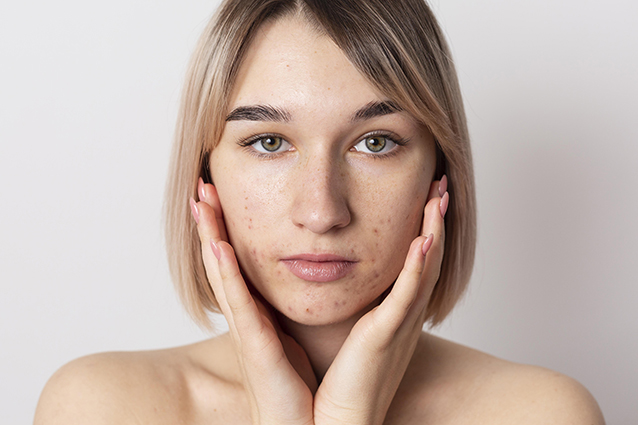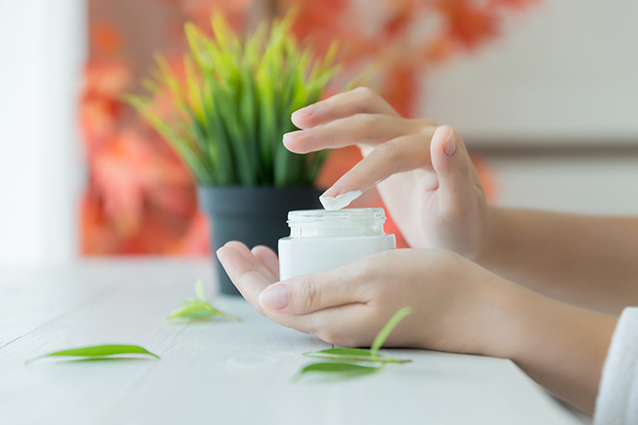Scratching may trigger sweaty herpes and fungal infection! How should I do to stop itchy skin in summer?

Hot days during the summer easily make one keep sweating, especially body parts such as face, scalp, chest, and back. Sweat that cannot be exported is mixed with sebum, and it is easy to inflame the hair follicles under the excessive friction of the clothes. Although sweat can be annoying, it’s just a normal metabolic phenomenon. Sweat itself doesn’t smell unless it is decomposed by germs, then the odor will occur.
Actually, sweat is necessary for us since it can help our body regulate the temperature. Basically, the smell problem can be controlled with proper hygiene habits.
Folliculitis is mainly caused by bacterial infection, followed by fungi
Sweat and sebum are easily secreted excessively during hot and humid days, and folliculitis will follow by the clogged pores. “Don’t underestimate red and itchy pimples since they may turn into cellulitis if they get worse.” Said the dermatologist. In addition, acne is also a kind of folliculitis, which is the inflammation caused by acne bacteria. Thus, serious folliculitis may occur when the acne problem gets worse. Basically, folliculitis can be divided into three groups:
●Bacterial folliculitis
Skin infections by bacteria, such as Staphylococcus aureus and Pseudomonas aeruginosa, easily occur with the weak immune system and open wound. In addition, the infection will also occur in public facilities with poor sanitation, such as hot springs, saunas, swimming pools.
●Fungal acne
Over reproduction of Pityrosporum ovale and P. orbiculare triggered by greasy skin will disturb the balance of flora on the scalp and cause dandruff, or even partial hair loss. If dandruff and hair loss problems are not treated well, hair follicles will become inflamed and last for a long time. Hair follicles will be thus damaged and unable to produce hair.
●Pseudofolliculitis barbae
This kind of folliculitis results from inappropriate hair shaving or removing, such as pulling or scratching the hair, which causes damage to hair follicles or ingrown hair.
Improve the protection of the body
It is difficult to change the environment we live in, but we can develop a habit of self-protection. Following the steps below can help you avoid folliculitis:
1. Don’t touch your face with your hands frequently
Hands are the part that will often touch things, such as banknotes, keyboard, doorknob, and stair handrail. Germs on these things will thus attach to hands and stick to sweat and sebum on your face, making your skin condition worse. Therefore, apart from washing hands often, it is also important to break the habit of touching your face with your hands.
2. Examine the way of cleaning
The reason for having acne may be caused by wrong cleaning methods instead of bad hygiene habits. The common issue is excess sebum production, which easily causes inflamed with inappropriate cleaning methods. In addition, exfoliating too often or over-cleaning will bring off the protective layer of skins, which means skins will thus lose protection.
3.Stop eating fat-rich and sugar-rich food
Fat-rich, sugar-rich, and spicy foods stimulate the secretion of sebum which will easily make pimples grow.
4. Stay away from dirty environment
There are many pollutions in outdoor air condition, which may attach to your face and block pores. Furniture at home needs to be cleaned frequently, at least once every two weeks, and keep the environment ventilation to avoid the humid condition.

Apart from cleaning, managing is also important
Many cosmetics and care products are very nutrient themselves, and generally, they are neutral since they will apply to our skins. This kind of ingredient composition is suitable for microbe growth! Things we need to notice is that once the care product being opened and exposing to the air, it will oxidize and be contaminated by bacteria and molds. To avoid this situation, it’s acceptable to use the preservative certificated by the verification agency.
Then how do we preserve these care products? Apart from keeping our hands clean before using the care product, it is important to understand the meaning of the “expiration date” and “period after opening (PAO)”.
Before care products launch, they need to go through many tests, such as stability testing, microbial testing, and temperature testing. After all of these processes, products can hit the store shelves and be given the expiration date and PAO.
Except for the expiration date, PAO is another standard that applies to the product which has already been opened and exposes to the external environment. Generally, there is a symbol written on the bottom or lateral side of the product’s packaging. For example, if the symbol is written with the words 6M, it means the PAO of this product is 6 months.
![]() Welcome to join YCM official Line, and we can answer any moldy questions immediately!
Welcome to join YCM official Line, and we can answer any moldy questions immediately!
![]() Welcome to join the YCM fan club and get the YCM information at once.
Welcome to join the YCM fan club and get the YCM information at once.

Leave a Reply
Want to join the discussion?Feel free to contribute!